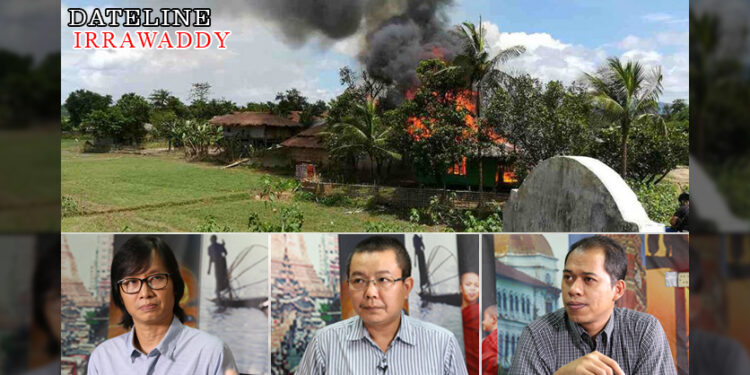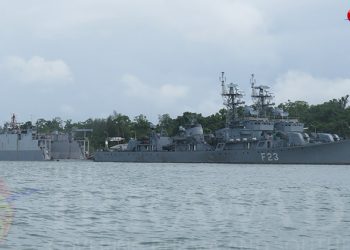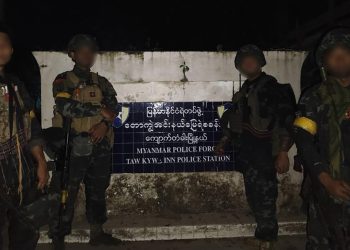Kyaw Zwa Moe: Welcome to Dateline Irrawaddy! This week, we’ll discuss the intensified conflict in Rakhine State. As everyone knows, Arakan Rohingya Salvation Army (ARSA) attacked about 30 police outposts in the early morning of August 25. So far about 100 people and more than 10 security personnel have been killed. From this, we can conclude that the Rakhine State problem has reached a new level. In the aftermath of the attacks, the government declared ARSA as a terrorist group. The Tatmadaw has also started clearance operations.
The Belgium-based International Crisis Group (ICG), which analyzes crises across the world, issued a statement on August 27, which provides a recommendation to the Myanmar government and Tatmadaw. The statement said a disproportionate military response without any overarching political strategy would once again play directly into ARSA’s hands. The Irrawaddy Burmese and English news editors Ko Ye Ni and Ko Kyaw Phyo Tha will join me to discuss this. I’m Irrawaddy English editor Kyaw Zwa Moe.
Ko Kyaw Phyo Tha, ICG said a disproportionate military response without any overarching political strategy would once again play directly into ARSA’s hands. What does that mean?
https://www.facebook.com/theirrawaddy/videos/1742210155823834/
Kyaw Phyo Tha: It seems that ARSA has predicted a certain result from its attacks this time. The government and especially the Tatmadaw would respond to its attacks. If there is a disproportionate military response…it [ARSA] wanted to recreate the same situation as October, 2016. That time, the military responses drew considerable criticism from the international community. That’s what ARSA wanted this time too, so that the Rakhine issue would be more highlighted on the international stage. That is its end.
KZM: They attacked police outposts in October, 2016. Then, Tatmadaw and security forces launched counter-attacks, which lasted for almost a month. Eventually this led to organizations like the United Nations raise questions and there were exaggerated claims of genocide. Now the government’s counter-terrorism committee is responding. Ko Ye Ni, what is your assessment of the situation on the ground?
YN: I agree with ICG’s recommendations. I don’t think the attacks in Maungdaw can be solved through military means alone. The State Counselor’s Office and the government declared ARSA as a terrorist group, formally recognizing the arrival of terrorism in Myanmar, and declaring a war on terrorism. This reminds me of the 9/11 terrorist attacks on the World Trade Center in the United States in the recent past. The United States then launched wars on terrorism in Iraq and Afghanistan. Initially, the broad conception was that its attacks were targeted at Muslims. Then the United States had to explain that they were not targeting Muslims, but terrorism and that there were also Muslims who oppose terrorism, and Muslim countries that oppose terrorism were supporting the United States. So, taking a look at the nature of its war on terrorism, it is a long fight and calls for minimizing repercussions, adhering to international norms and soliciting support from other countries. This is the case for the Rakhine issue. As the ICG has pointed out, military response alone will worsen the circles of violence. And the military’s blanket approach in countering terrorist attacks will play into the hands of the other side, which has claimed genocide.
KZM: That is one of two points ICG has made—the principle of proportionality. It said the Myanmar government should only use force proportional to the militants. But if it uses excessive force, it will create big troubles for the government. Another point is how to distinguish between ARSA terrorists and their supporters and civilians, and provide humanitarian assistance to civilians. Otherwise there is a possibility that counter-terrorism operations will be labeled as genocide. There were such accusations following the clearance operations in the aftermath of the October attacks last year. So, ICG made a good point regarding this. Ko Kyaw Phyo Tha, what is your assessment? Many international media agencies have alleged that the military shot civilians in its operations. And local media agencies still don’t have access to the area.
KPT: I’ve talked about this with many analysts. They have said it is important that the government and the military have a unanimous decision on resolving the ongoing attacks. Because it is no longer a domestic issue, but reached the international stage. They said they heard that ARSA was using children and women as a human shield. So, it is quite difficult for security forces to handle them. We can’t leave this issue unsolved. This must be solved. Analysts pointed out that it is important that the government and the military make one decision regarding how to respond to those difficulties. Only then, will they be able to form a single voice and explain in the case of international allegations.
KZM: What is politically interesting to see is that attacks in Buthidaung, Rathedaung and Maungdaw were launched on August 25 immediately after the Arakan State Advisory Commission led by former United Nations Secretary General Kofi Annan released its report and provided recommendations for the government. This shows that ARSA and their followers do not accept the recommendations of the Kofi Annan Commission. The commission was established last year. The government gave a mandate to the commission, but only for providing recommendations. That time, three institutions opposed the formation of the commission—the Arakan National Party (ANP), the previous ruling Union Solidarity and Development Party (USDP), and military representatives to Parliament. A motion was submitted to reject the commission in Parliament. But it failed, so the commission was formed. After the commission released its report [which was followed by attacks in Maungdaw], State Counselor Daw Aung San Suu Kyi immediately released a statement with her signature that terrorist attacks would not stop or deter her government from implementing the recommendations of the commission. This is an interesting point, I think. The military has completely different ideologies from the ARSA. They will do nothing else but fight them. But from a political point of view, it is an interesting thing to see.
YN: As Ko Kyaw Zwa has said, if the operation has reached a level of counter-terrorism, there must be new insights that fit the new level, and new approaches must be made to solve the conflict. If the government takes the same approach, the problem won’t be solved. And taking a look at the attacks, we can clearly see how strongly [ARSA] has built its influence among the villagers by exploiting their grievances and anger. How can we reduce their influence and make [Rohingya people] owe allegiance back to the jurisdiction of our country? We already have an answer for this. The Kofi Annan commission’s report has provided recommendations. I think it is better [for authorities] to do what they can rather than saying they can do nothing, otherwise the circle of attacks would start again.
KZM: What Ko Kyaw Phyo Tha has pointed out is also very important. It is important that the government and the military are in the same place. And surely, Arakanese people, and parties like the ANP that represents them make one voice. If they have different views, I’m afraid places like Maungdaw and Rathedaung will become a breeding ground for terrorist groups. If that is the case, problems may arise in the years to come as Ko Ye Ni has mentioned. It all will depend on cooperation between the country’s leaders, military leaders, leaders of Rakhine parties, Arakanese leaders and surely the leaders of the Muslim population in Rakhine State. Thank you for your contribution.
Translated from Burmese by Thet Ko Ko.

















